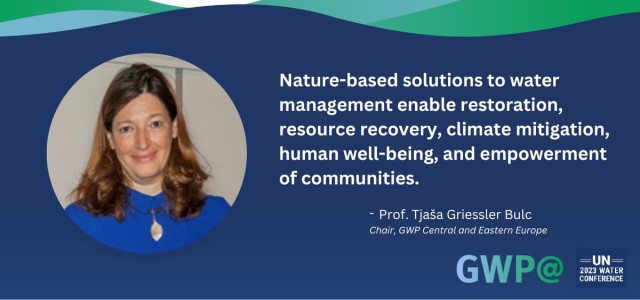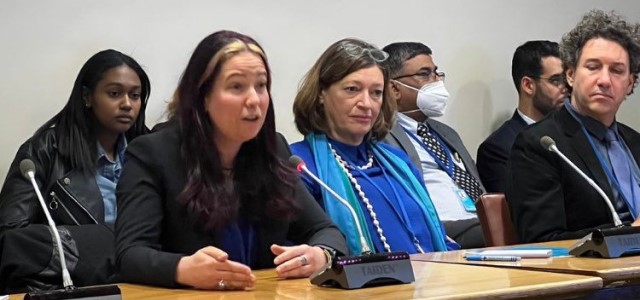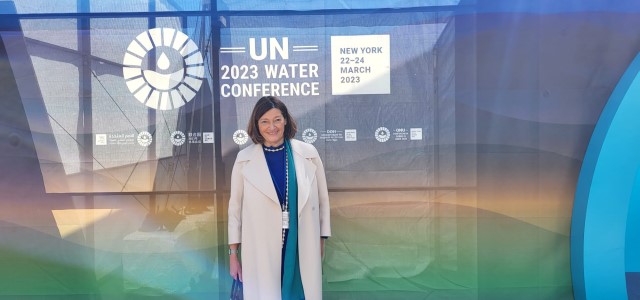Prior to the UN Water Conference 2023 in New York, organizations all over the world worked hard on submitting their commitments to show their support. Based on the current Global Water Partnership Central and Eastern Europe (GWP CEE) strategy goals, GWP CEE partners decided to address the UN-Water SDG6 - Clean Water and Sanitation & SDG 13 - Climate Change to cope with current challenges: food-scarcity, recovery and reuse of valuable resources such as water, nutrients, biomass, and energy. What was your role in creating the said commitment and what do you think about its final form?
I believe that the Nexus approach (water, nutrients, biomass, and energy) offers holistic understanding of how food, water, waste and energy, the main goals within SDG 6 & 13 are important to be addressed as well as resource reuse and recovery with different important stakeholders. In the Nexus context, nature-based solutions (NBS) are often built without considering the circularity, often fulfilling only a single function with little consideration of their recovery potential of waste and water or their positive symbiosis with other systems. While presenting NBS at the side event “Waterlution”, at Permanent Mission of Canada to the United Nations in New York, I tried to show NBS valuables like ecosystem services, circularity potentials and multi-functionality for moving towards UN-Water SDG 6 - Clean Water and Sanitation & SDG 13 - Climate Change offering a clean water production, nutrient recovery, heavy metals retention and recovery and a broad range of plant-based materials. However, the most important key to achieve these SDGs is to create a science-based approach within strong expert knowledge platforms, also to avoid many problems when changing gray infrastructure into green in the long-term and to fulfill the expectations of investors and end-users.

You were invited to a UN Waterlusion side event hosted by Canada as a panelist and lecturer on the topic of Nature-Based Solutions and New Models for Water Action – conflict management. What did you bring to the attention of the participants and what were the similarities and differences when compared to the rest of the panelists?
Waterlusion, which is a Canadian water-focused organization, being active for 20 years in 6 continents, organized an excellent and high professional side event. All the presenters focused their talk on the real meaning of transboundary, inclusion and new collaboration, youth-centered approach, gender equality by concrete showcases from Waterlusion regions such as Latin America, but also from GWP South Asia, and GWP CEE. The innovation and business development model were presented by UN-member, CEWAS-Sanitation and Water Entrepreneurship Pact. Listening to a new song of rivers written by a Brazilian artist, admiring water from Latin America rivers crossing many boards, and following the stories of brave women running small successful businesses in the water sector made the event very special. The NBS projects, such as our growing Community of Practice within the IWRM Toolbox, which I presented at this event, has attracted the interest of young engineers who are searching for new relevant knowledge on this topic.
You also spoke at the side event at the UN HQ on the topic of Rewriting the Rules for Partnering on the 6th ingredient: conflict of management. What was it about and what was the reception from the audience and the rest of the event actors?
The event was organized by GWPO, and it focused on demonstrating practical approaches to drive cooperation and partnership at all levels in order to help to achieve SDG 6 and other water-related goals and targets. Pablo Bereciartua, our GWPO Chair, as a keynote speaker, was introducing the importance of SDGs. Further on, Laurent-Charles Tremblay-Lévesque from GWPO introduced six ingredients for building effective partnerships for water management, which were presented by Prof. Petra Hellegers from the Water Resources Management Group, WUR, Klaus Leroch from Austrian Development Agency, Damian Indij from UNDP Cap-Net, Tom Williams from WBCSD Extended Leadership Group, Cholpon Aitakhunova from International Secretariat for Waterand, and by myself. We presented different aspects of how to establish and sustain effective multi-stakeholder partnerships (MSPs) for water management in different environments. I was talking about conflicts in water management (6th ingredient) that can be also seen as a trigger of an important awareness change. I presented one of the biggest environmental movements in the history of Slovenia from our CEE region known as a “Movement for Drinkable Water”. The MSPs formed by 32 NGOs, including GWP Slovenia, initiated a referendum to prevent the amendment of the Water act from potentially causing any harm to the aquatic environment, showing a remarkable public interest in the protection of the environment. This showcase can now be seen as a blueprint and a catalyst for ecological thinking and political practice, showing the power of MSPs to connect people for aquatic environment protection. In the 2nd part of the event presenters were sharing insights and experience from examples of partnership-based initiatives. His Excellency Jakaya Mrisho Kikwete– Fourth president of Tanzania, Africa Coordination Unit Chairman, GWPSA as a keynote speaker presented the value of water partnerships to achieve SDG 6. Gareth James Lloyd from UNEP-DHI Centre introduced SDG 6 monitoring issues and how to identify action pathways to improve water management, Lesley Pories from GWPO presented decisionmakers approach for developing climate-resilient water policies and plans, Alex Simalabwi from GWP Global Head–Climate Resilience talked about how to track priority water related investments, while Dr. Yumiko Yasuda from GWPO presented transboundary water cooperation derived from the sectoral and spatial organization of administrative and governance structure. The event was very well attended, but due to a very limited time it was closed without discussion.

One of the UN Water Conference focuses was an appeal to create strong partnerships to result in a bold Water Action Agenda. When attending live, have you witnessed any major partnership being established? What were their commitments and scope?
Although knowing that NBS can be the game changer in the achievement of the Sustainable Development Goals I was honestly surprised how many side events were devoted to NBS topics and showcases. Furthermore, at the side event on 23 of March at New York Water House I attended, a coalition for mainstreaming NBS was initiated by several organizations, including Asian Development Bank, Netherlands Enterprise Agency (RVO), Invest International, Rijkswaterstaat, World Wildlife Fund (WWF), Wetlands International and EcoShape as a commitment to the UN Water Action Agenda. The coalition aims to create a breakthrough in the application and implementation of NBS for water-related challenges and to make NBS a widely accepted practice by 2030. I hope that our Community of Practice as a part of IWRM Toolbox and COST Action Circular City can contribute with our expert knowledge (> 650 experts from 40 countries) to strengthen such movements and initiatives in the future.
With the Conference now finished, what are the next steps in GWP CEE’s commitment and how can people in the CEE region track it or even be part of it?
I think that we are on the right track focusing on transboundary, NBS, drought and on youth-centered approach. Our commitment to NBS Community of Practice to increase expert knowledge and awareness can be an important initiative for the investors, governments and even science-based platforms, especially because we can offer many showcases which can be easily transferred to other GWP regions. I think that the UN 2023 Water conference contributed to the visibility of our region despite the high number of important side events, especially because of our expertise on NBS, which can offer solutions for drought, flood, sanitation within transboundary activities and training of young engineers. The future activities will be focused on potential fundraising for our knowledge-based communities.
Dr. Tjaša Griessler Bulc is a Full Professor who works at the University of Ljubljana, Slovenia, and leads national and international projects. She is also the Chair of the GWP CEE. Her interdisciplinary work in the field of NBS focuses on strategies and legislation for environmental pollution. Dr. Bulc has received several awards for her research, including the Lillehammer Award for Innovation, the National Envrionmental Technology Award, and the Energy Globe Award. She has been involved in various R&D projects, including H2020, Horizon Europe, and Life+. Dr. Bulc is also a certified European Project Manager and a member of the Advisory Board of the International Ecological Engineering Society.
